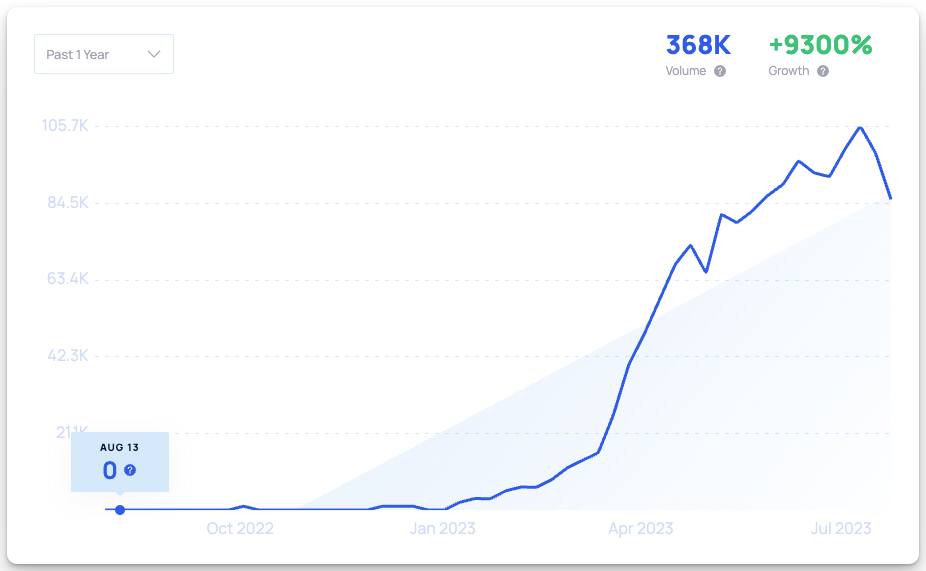🎾 Tips On Getting a "Yes", LangChain Buzz, PM Necessity, Perfect PRD Tips [Experimental Edition]
+ 3 Fun Finds
Estimated read time: 3 minutes 33 seconds.
This is Sunday 1-1-2-3 with George.
Welcome to the 90th edition.
I can’t believe I’ve shipped this for 90 weeks without a break 🤯
Today I want to try something new with the format:
1 x Trending Topic in Tech: LangChain
1 x Big Idea: Is Product Management Necessary?
2 x Quick Bites: 10 Sections To Make Your PRD Complete & How To Ask (For Resources, Support, Etc.) And Get a “Yes”
3 x Fun Things I’m Enjoying & Exploring: The Flash - Anatomy of a Failure, Kim Dracula and Books I’m Enjoying
If I don’t get massive unsubscribes and negative feedback, I might keep the format.
You let me know by responding to the survey at the bottom!
📈 LangChain
LangChain has been an exploding topic in the tech space in the last 6 months:
If you are a product manager who is interested in building applications that leverage the power of language models, you should read this.
LangChain is a framework for developing applications powered by language models. It enables applications that are:
Data-aware: connect a language model to other sources of data
Agentic: allow a language model to interact with its environment
Let’s dive in.
How does LangChain work?
LangChain provides standard, extendable interfaces and external integrations for the following modules:
Model I/O: interface with language models
Data connection: interface with application-specific data
Chains: construct sequences of calls to language models and data sources
Agents: let chains choose which tools to use given high-level directives
Memory: persist application state between runs of a chain
Callbacks: log and stream intermediate steps of any chain
These modules can be used independently or together to build applications powered by language models.
For example, you can use the Model I/O module to easily call any language model with a single line of code:
from langchain import ModelIO
model = ModelIO("gpt3")
response = model.query("Hello world")
print(response)
Or you can use the Data connection module to connect a language model to any data source, such as a database, a web page, or an API:
from langchain import DataConnection
data = DataConnection("https://api.apify.com/v2/datasets/7Fdb90FMDLZir2ROo/items?format=json&clean=1")
response = data.query("What is the name of the first item?")
print(response)
Or you can use the Chains module to create sequences of calls to language models and data sources, such as a chatbot that answers questions using Wikipedia:
from langchain import Chain
chain = Chain([
{"type": "model", "name": "gpt3", "params": {"prompt": "Q: {query}\nA:"}},
{"type": "data", "name": "wikipedia", "params": {"query": "{response}"}}])
response = chain.run("Who is the president of the United States?")
print(response)
Or you can use the Agents module to let chains choose which tools to use given high-level directives, such as a summarizer that selects the best source and model for a given topic:
from langchain import Agent
agent = Agent([
{"type": "chain", "name": "summarize_news", "params": {"source": "newsapi", "model": "gpt3"}},
{"type": "chain", "name": "summarize_wiki", "params": {"source": "wikipedia", "model": "gptj"}}])
response = agent.run("Summarize the topic of LangChain")
print(response)
How to get started with LangChain?
If you want to get started with LangChain, you can follow these steps:
Install LangChain using pip or npm:
pip install langchain
or
npm install langchain
Set up your environment variables with your API keys for the language models and data sources you want to use. You can find more details on how to do this in the documentation.
Here are some great guides:
🪨 Is Product Management Necessary?
I'm a Product Manager who works with a lot of designers.
(I have even managed some. Don't ask how that's possible.)
Is my work necessary?
Not at all.
And also, absolutely.
Wait, what?
Why the paradox?
🍪 Quick Bites
🕹 Let’s Have Fun
🎬 Few people know that my original career choice was to be a movie director. My mum told me off. “It would be a struggle.”
Well, it was still a struggle with a business degree. Sometimes I wish I had followed my gut.
I love watching these deep videos dissecting movie failures. Helps me understand storytelling as well:
🎧 I might alienate 90% of my audience with this, but I have to talk about this new artist.
Kim Dracula released a debut album recently (which I really liked).
It all started with this absolutely insane and unhinged song:
📚 I struggle to just read 1 book.
I started reading Genius Makers: The Mavericks Who Brought AI to Google, Facebook, and the World (4.29 on Goodreads).
The first story about Geoffrey Hinton (“godfather of AI”) read like a high-stakes thriller.
I’m also pleasantly surprised by Stephen King’s “The Institute”.
I’m only 30 pages in, but it also reads super-well. I haven’t got to the horror part, and sometimes these books fall apart in the 3rd act (classic PM problem, too), but the reviews are really good, so I’m hopeful.
And if you’ve been following the UAP reveal, I’ve been thinking about weird alien stories, so here’s my pick:
I don’t mention The Three-Body Problem because it’s Lord Of the Rings-famous.
That's a wrap for today. Stay focused and see you next week! If you want more, be sure to follow me on Twitter (@nurijanian)
😀 What did you think of this week's newsletter?
Loved it | Great | Good | Meh | Bad
If you enjoyed this, please consider sharing it with a friend. If a friend sent you this, get the next newsletter by signing up below.
Who's George?
I’m an underdog product manager.
Product management in New Zealand (where I live) is still a relatively immature discipline. I also came into it late via data science and UX. I may be older than others, but I often feel like a rookie.
To become better at my craft, I learn and explore new ideas relentlessly.
Then I share high-quality, tried-and-true ideas that can be used right away.
How I can help you:
If you want to feel smarter, I’ve compiled my best actionable finds in prodmgmt.world.
If you need to figure out prioritization in your role, get The Big Book of Prioritization.
See you next week.
— George.



